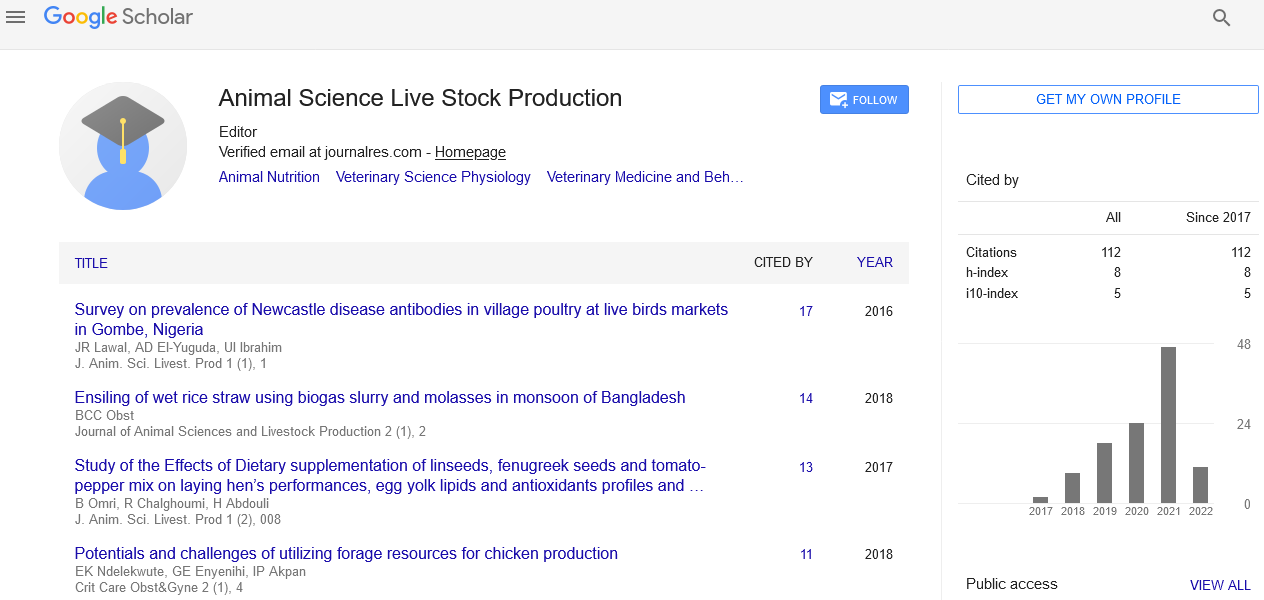Commentary - (2024) Volume 8, Issue 1
The Cow: Symbol of Prosperity, Provider of Nourishment
Hinata Kai*
Department of Animal Sciences, Sophia University, Japan
*Correspondence:
Hinata Kai,
Department of Animal Sciences, Sophia University,
Japan,
Email:
Received: 28-Feb-2024, Manuscript No. IPJASLP-24-19308;
Editor assigned: 01-Mar-2024, Pre QC No. IPJASLP-24-19308 (PQ);
Reviewed: 15-Mar-2024, QC No. IPJASLP-24-19308;
Revised: 20-Mar-2024, Manuscript No. IPJASLP-24-19308 (R);
Published:
27-Mar-2024, DOI: 10.36648/2577-0594.8.1.04
Description
Cows, often revered in various cultures around the world,
stand as a symbol of prosperity, sustenance, and harmony with
nature. From the rolling hills of rural landscapes to the bustling
markets of urban centers, the presence of cows is deeply ingrained
in the fabric of human civilization. Beyond their placid
demeanor and gentle eyes lies a creature that has been a cornerstone
of agricultural societies for millennia. Cows, primarily
Bos taurus and Bos indicus species, have been domesticated
for approximately 10,000 years. Their importance in agriculture
cannot be overstated. In many agrarian economies, they
serve as the backbone of farming, providing essential resources
such as milk, meat, and leather. From the plowing of fields
to the transportation of goods, cows have been indispensable
partners in human endeavors. Milk, often referred to as “white
gold,” is perhaps one of the most valuable contributions of
cows to human diet and health. Rich in essential nutrients like
calcium, protein, and vitamins, milk serves as a primary source
of nourishment for millions worldwide. Beyond its liquid form,
milk is processed into various dairy products like cheese, butter,
and yogurt, enriching culinary traditions across cultures.
Furthermore, cows also offer a sustainable source of meat,
particularly beef, which is a staple in many diets globally. From
succulent steaks to hearty stews, beef provides a rich source
of protein and essential amino acids, vital for human growth
and development. The reverence for cows transcends mere
economic utility; it is deeply intertwined with cultural and religious
beliefs in many societies. In Hinduism, the cow is considered
sacred and revered as a symbol of wealth, abundance,
and maternal qualities. The revered status of cows is reflected
in various rituals, festivals, and even legal protections in countries
like India, where harming a cow is considered a grave offense.
Similarly, in other cultures, such as those found in parts
of Africa and Southeast Asia, cows hold symbolic significance
as a measure of social status and wealth. Owning cattle signifies
prosperity and stability, often determining one’s standing
within the community. Beyond their role as providers of food
and cultural symbols, cows also play a crucial role in sustainable
agriculture and environmental stewardship. As ruminant
animals, they possess a unique digestive system capable of
breaking down cellulose-rich plant material. Through grazing,
cows help maintain grasslands, preventing the encroachment
of invasive species and promoting biodiversity. Moreover, their
manure serves as a natural fertilizer, enriching soil fertility and
reducing the dependence on synthetic chemicals. Integrating
cows into regenerative agricultural practices can mitigate soil
erosion, sequester carbon, and enhance overall ecosystem
health. Despite their myriad contributions, cows also present
challenges, particularly concerning environmental sustainability
and animal welfare. The intensive production of beef and
dairy products has been associated with deforestation, greenhouse
gas emissions, and water pollution. Addressing these
challenges requires innovative solutions, such as sustainable
farming practices, alternative feed sources, and technological
advancements in animal husbandry. Furthermore, ensuring the
welfare of cows is paramount, necessitating humane treatment
and ethical considerations throughout the supply chain. Initiatives
promoting pasture-based grazing, access to clean water,
and comfortable living conditions are essential for upholding
the dignity and well-being of these sentient beings. The cow,
revered for its contributions to agriculture, culture, and environmental
stewardship, occupies a unique and cherished place
in human society. As we navigate the complexities of modern
food systems and sustainability challenges, it is imperative to
recognize and honor the profound significance of cows in shaping
our past, present, and future.
Acknowledgement
None.
Conflict Of Interest
None.
Citation: Kai H (2024) The Cow: Symbol of Prosperity, Provider of Nourishment. J Animal Sci. 8:04.
Copyright: © 2024 Kai H. This is an open-access article distributed under the terms of the Creative Commons Attribution License, which permits unrestricted use, distribution, and reproduction in any medium, provided the original author and source are credited.

